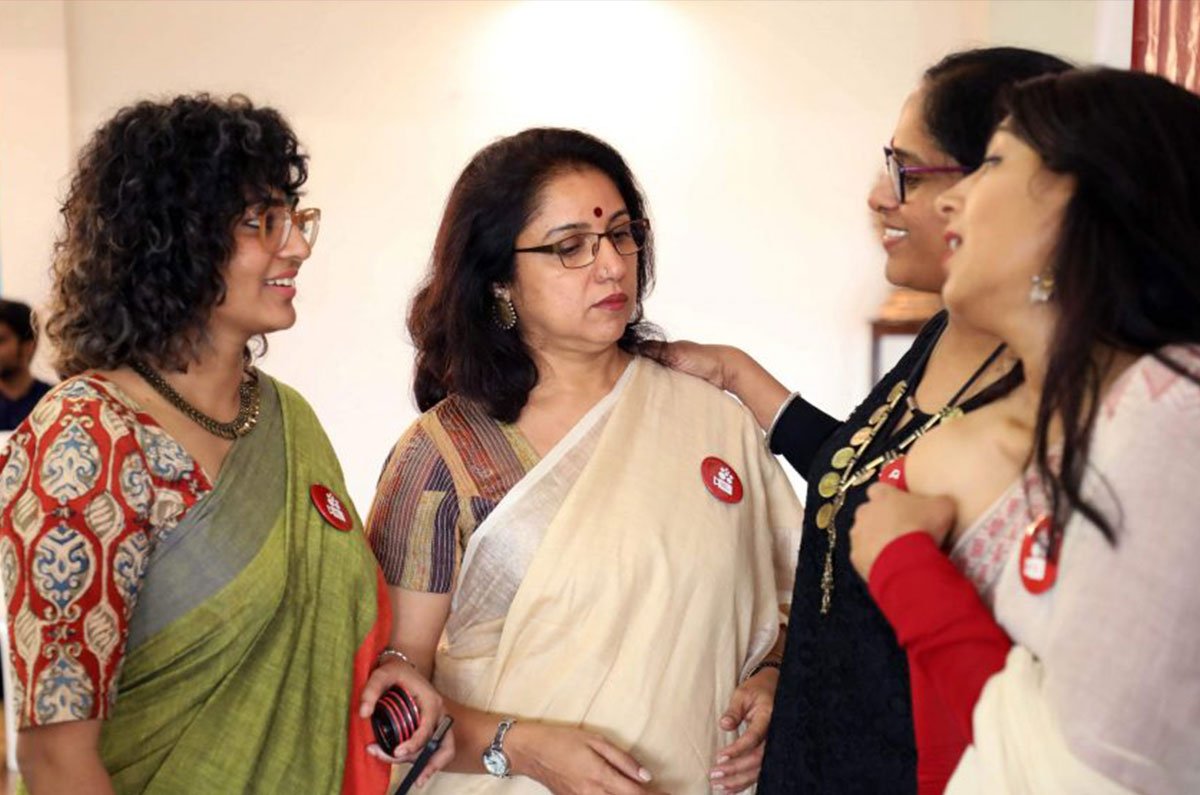In her essay “The Many Misogynies of Malayalam Cinema”, Meena T. Pillai criticises Kerala’s cultural industry as being a commercial enterprise entrenched in ‘mafiaisation’, illicit business, money laundering, hawala dealings, pimping, blackmail, and extortion.
The kidnapping and assault of the popular Malayalam actor on February 17, 2017, is one of the many gruesome examples that justify this accusation by Pillai. The prime accused of masterminding the assault, ‘Janapriya Nadan’ Dileep, remains free of charges as four and half years passed since the event with no clear judgement being passed on the case and much of the film fraternity including its actors’ collective, Association of Malayalam Movie Artists (AMMA), siding with Dileep even as the survivor too was formerly a part of the organisation. It acts as an example of how men who possess enormous wealth and influence have been able to silence dissenting voices by commanding control over bodies of power.
The negligence of AMMA as a body for protecting actors irrespective of gender and favouring of Dileep, coupled with cumulative years of tedious and precarious working conditions all coincided and led to 18 female cine workers forming the Women in Cinema Collective as a recognised society in 2017. WCC was created on the common understanding that isolated challenges against the bastion of patriarchy would do little to no good in gaining momentum for inciting change but in fact, lead to reputational damage and ostracisation.
The inferior status engendering the woman experience in societies today is not a result of isolated individual action or circumstantial consequences, but structural inequality and systemic sexism. The same is the case within the film industry as female actors have been slut-shamed, groped, body-shamed and victims of gossip, resulting in many quitting the profession. The field as a whole has been coded to be socially amoral for women to participate in by many as they have hardly been able to voice their concerns, let alone propose and enact change for gender-sensitive work ethics and safe work environments. The inherent privilege that organisations like AMMA or FEFKA give its male members and their inaction regarding gender-based violence made it obvious that the executive committees of both organisations (mostly men) were indifferent to their female members. Therefore, an alternate and oppositional body had to be created if dissenting voices were to be raised and changes enacted.
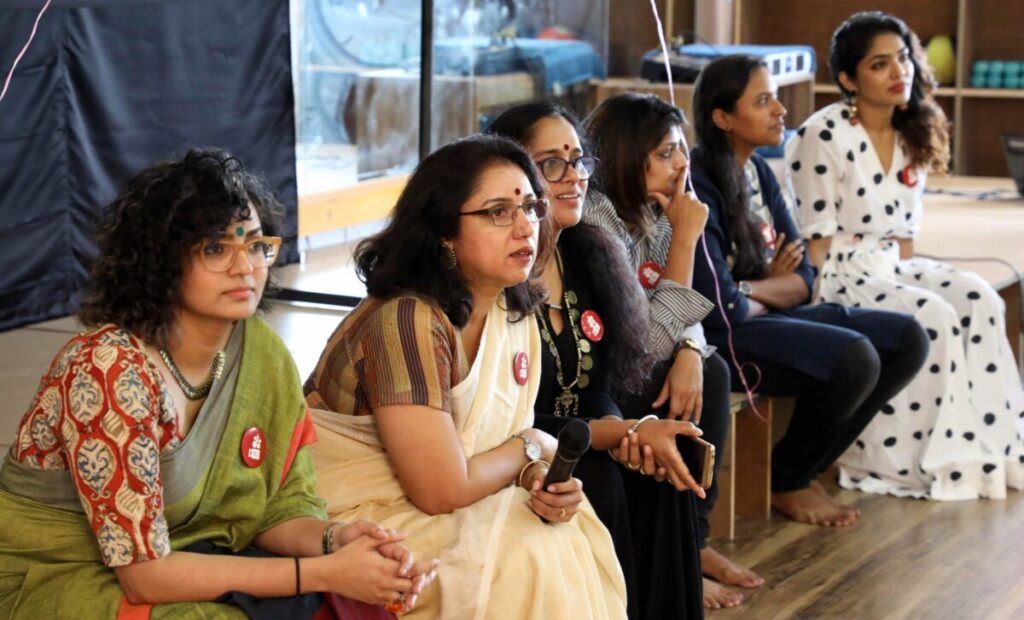
The negligence of AMMA as a body for protecting actors irrespective of gender and favouring of Dileep, coupled with cumulative years of tedious and precarious working conditions all coincided and led to 18 female cine workers forming the Women in Cinema Collective as a recognised society in 2017. WCC was created on the common understanding that isolated challenges against the bastion of patriarchy would do little to no good in gaining momentum for inciting change but in fact, lead to reputational damage and ostracisation.
Also read: WCC, Hema Commission And The Fight To Address Systemic Abuse In The Malayalam Film Industry
The organisation strives for ethical and safe working conditions for women while simultaneously advocating for better access to cine-related occupations that have been stereotypically coded as masculine like production, cinematography, and directing. Beyond the boundaries of the organisation itself, WCC frequently engages in conversation with a broader community of experts ranging from academic scholars, lawyers, journalists, social activists, entrepreneurs, politicians, and other cine workers from other film industries to maximise legal assistance, professional advice and ultimately creating a network of support.
Shift Focus: Women Shaping the Narrative in Media and Entertainment, an eclectic report prepared by WCC in collaboration with SAKHI, is an example of one such external collaboration that WCC has engaged in. With the aim of mapping organisational gender discrimination within the film industry and suggesting solutions for the same, Shift Focus was released as a manual for promoting credible workspace ethics and maintaining moral conduct within the largely informal and unorganised film industry.
The WCC values shared experiences and varied perspectives in understanding social situations to prevent itself from being a naive self-serving entity entrenched in its own unilateral politics. It privileges diversity and inclusiveness with the understanding that promoting the works of female cine workers from diverse backgrounds on grounds of caste, religion and sexuality would ultimately propagate productions of more diverse, commercially viable movies. WCC has collaborated with Queerala for Q-Loid, a queer film festival for promoting representation of alternative and marginalised sexualities and formed the P. K. Rosy Film Society, in memory of the first female actor in Malayalam Cinema, to democratise the film viewing experience, especially international film, as it was previously a practice engaged predominantly only by men.
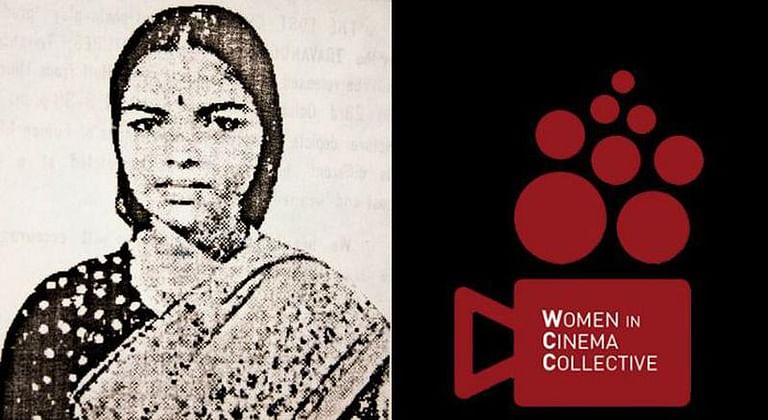
Source: Homegrown
The collective organises gender sensitisation workshops, career seminars and even “puts together a network of counsellors who would be on-call for aggrieved women who are facing negative experiences in the industry”. The Fatma Begum Research Network, named after India’s first woman director, is yet another initiative by WCC to further discourse on feminism and cinema and to facilitate independent research with the aim of making it available to the larger public.
The reality of the ‘casting couch’ within the Malayalam film industry was another major finding of Shift Focus. Female actors are often asked to make “adjustments” or engage in “sexual favours” for getting role credits in films. The exposing of such malevolent practices as normalised acts in the industry gives credibility to female actors to share their stories of non-consensual sexual advances and question patrifocal feudal practises embedded within the industry.
Also read: Paradoxes Of Working Women In Tamil Cinema
One such example is the case of Alencier Lopez who was accused by one of the female actors for physical misconduct. With the support of WCC, the survivor was able to bring the case to mainstream attention and force Lopez into a public apology. More recently, leading producer Vijay Babu had a similar accusation levied against him forcing him into hiding. The Shift Focus report also contextualises the existence of a pervasive locker room culture as a result of the extremely unequal gender ratio on film sets with the number of men being much higher than women. This is also the case with screenwriters as the writing process often occurs in informal spaces like hotel rooms thus blurring the lines of what ‘workspace’ entails. A lack of an Internal Complaints Committee on film sets is also a major problem which contributes to the aforementioned issues.
Furthermore, women filmmakers struggle to have their story pitches heard or their stories are sidelined as inconsequential soft subjects. They are alienated from other technical roles like cinematography, sound design, and direction and instead, are stereotypically cast into roles of make-up, hairstyling and costume designing. More than a lack of interest or talent, it is an inherent attempt to exclude prominent technical aspects of filmmaking to a reserved gender that prevents women technicians from being recognised. Often, women are not even credited in the films for the roles they perform in any of the technical fields and almost always get overshadowed by male artists.
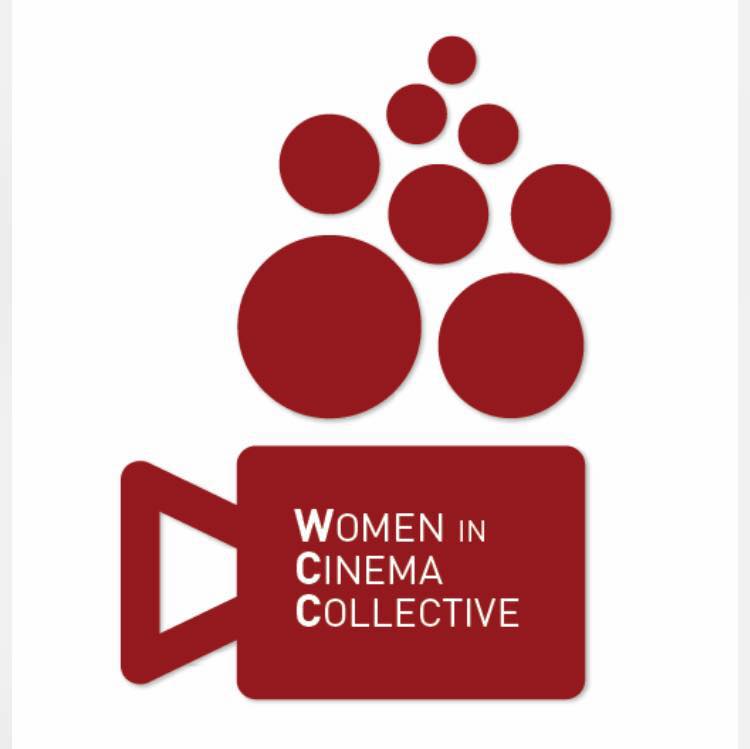
The WCC strives to address these problems by providing legal assistance, creating awareness of exploitations and engaging with the media to perform public demonstrations of dissent. Thereby, the collective has started pricking the bubble of patriarchal hegemony plaguing the film industry and has initiated embedding a progressive sensibility regarding gender within audience members and filmmakers alike. This has resulted in many retrospective re-readings of past misogynistic portrayals of women in cinema and has been canonised in the 2018 agenda of WCC’s Punarvayana, which seeks to award films that pass the Bechdel Test to promote more women-friendly egalitarian filmography.
With opposition against dominant hegemonic bodies, comes stronger hegemonic oppression. Several women who have banded together with the WCC claim that they were denied work because of this initiative. The popular press often denigrated the actions of the WCC, quoting them to be merely a ‘handful of feminists’ and not representative of the larger female community working within the industry.
Even as the workforce in Kerala has been largely unionised since the mid-twentieth century, something in which women have played an important part, the creative industries have largely remained unorganised and whenever they have organised into bodies like AMMA or FEFKA, they have been discriminatory and dismissive of women. As Darshana Mini quotes, the term cine-worker has typically been coded masculine and predominantly only privileged labour benefits for men. By unionising themselves as a collective of cine artists and technicians and creating a database of women workers categorised based on skill sets, WCC tries to adopt the role of a trade union for women film workers and streamline the process of recognising artists as labourers beyond the star-studded image of celebrities.
Although screen performance and production remain the central occupation and a prominent part of the identity of the women cine workers, when functioning as a collective, the members of the WCC engage themselves as social activists who push for a shared common utterance instead of individual performances, beyond the attention of the paparazzi, interviews, and gossip columns.
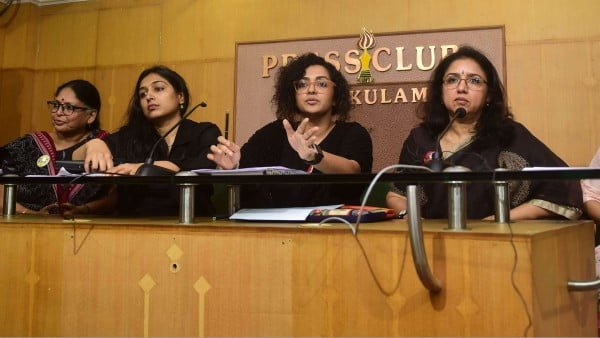
However, with opposition against dominant hegemonic bodies, comes stronger hegemonic oppression. Several women who have banded together with the WCC claim that they were denied work because of this initiative. The popular press often denigrated the actions of the WCC, quoting them to be merely a ‘handful of feminists’ and not representative of the larger female community working within the industry. AMMA too has tried numerous times to discredit the actions of WCC claiming their accusation of misogyny in the film industry to be baseless without any honest attempt to revise the reports produced by the collective or conduct detailed research themselves. During its silver jubilee celebrations, AMMA included a comical skit ridiculing the WCC by propagating a warped representation of the ‘modern feminist’ with women in sunglasses, carrying handbags performing far-fetched acts of tomfoolery.
Internal tensions are very much existent as well. As mentioned before, the radical opposition to the major governing bodies within the film industry has also resulted in female actors doubting if their affiliation with WCC would hinder their job opportunities.
Also read: Where Are Bahujan Women In Indian Cinema?
That being said, the existence of a women’s collective surely inspires and reassures new women cine-workers to enter the field knowing there is an organisation that will support them. A recent example is the support that WCC extended towards Kunjila Mascillamani after the latter was detained for protesting against Kerala Chalachitra Academy Chairman, Ranjith, for excluding her film, Asangadithar (2022) from the International Women’s Film Festival in Kozhikode. While more and more members continue to leave bodies like AMMA, WCC has inspired the rise of other female film organisations like itself such as the South Indian Film Women’s Association (SIFWA), Voice of Women and even a women’s wing within FEFKA.
References
Anand, Shilpa Nair. 2019. “Kochi gets its first LGBTQ film festival.” The Hindu. July 11. Kochi gets its first LGBTQ film festival – The Hindu
E Times: Entertainment Times. 2018. “Rima speculates on Manju Warrier’s absence in WCC”. Times of India. October 24. Rima speculates on Manju Warrier’s absence in WCC | Malayalam Movie News – Times of India (indiatimes.com)
George, Anjana. 2017. “Women in Cinema Collective will work for equal opportunity and dignity of women employees in Mollywood!” E Times: Entertainment Times. May 19. Women in Cinema Collective will work for equal opportunity and dignity of women employees in Mollywood! | Malayalam Movie News – Times of India (indiatimes.com)
Hercus, Cheryle. 1999. “Identity, Emotion, and Feminist Collective Action”. Gender & Society, vol. 13, no. 1: pp. 34-55. http://www.jstor.org/stable/190239.
Joseph, A., Paul B., Mahmood, A. S. P. and Sukumar, M. 2019. Shift Focus: Women Shaping the Narrative in Media and Entertainment. Women in Cinema Collective. https://wccollective.org/resources/.
Lindberg, Anna. 2005. Modernization and Effeminization in India: Kerala Cashew Workers Since 1930. Copenhagen: NIAS Press.
Mannil, B. M. 2020. “The Gendered Film Worker: Women in Cinema Collective, Intimate Publics and the Politics of Labour”. Studies in South Asian Film & Media, vol. 11, no. 2: pp. 191-207. https://doi.org/10.1386/safm_00028_1
Martin, Patricia Yanzi. 1990. “Rethinking Feminst Organizations”. Gender & Society, vol. 4, no. 2: pp. 182-206. https://doi.org/10.1177/089124390004002004
Mini, Darshana Sreedhar. 2019. “Gendered Precarity and Labor Organizing in the South Indian Film Industries”. In Joseph, A., Paul B., Mahmood, A. S. P. and Sukumar, M. Shift Focus: Women Shaping the Narrative in Media and Entertainment. Women in Cinema Collective: pp. 62-75. https://wccollective.org/resources/.
Nagaranjan, Saraswathy. 2019. “WCC to empower, educate and enrich women in cinema.” The Hindu. April 25. WCC to empower, educate and enrich women in cinema – The Hindu
Onmanorama Staff. 2020. “After Vidhu, costume designer Stephy flays WCC, targets ‘privileged layer’ in the collective“. Onmanorama. July 7. https://www.onmanorama.com/entertainment/entertainment-news/2020/07/07/vidhu-vincent-costume-designer-stephy-xavier-flays-wcc.html
Pillai, M. T. 2017. “The Many Misogynies of Malayalam Cinema.” Economic and Political Weekly, vol. 52, no. 33, Aug 19: pp. 52-8. https://www.epw.in/journal/2017/33/perspectives/many-misogynies-malayalam-cinema.html
Rajendran, Soumya. 2019. “From ‘casting couch’ to sexual harassment: The story in the south Indian industries”. In Joseph, A., Paul B., Mahmood, A. S. P. and Sukumar, M. Shift Focus: Women Shaping the Narrative in Media and Entertainment. Women Cinema Collective: pp. 36-47. https://wccollective.org/resources/.
Reger, Jo. 2002. “More Than One Feminism: Organizational Structure and the Construction of Collective Identity.” In David S. Meyer Nancy Whittier Belinda Robnett (Eds.), Social Movements: Identity, Culture, and the State, Oxford University Press.
Shrijith, Sajjin. 2020. “Women behind the scenes in Malayalam cinema are set to rise. The New Indian Express.” Women behind the scenes in Malayalam cinema are set to rise- The New Indian Express
